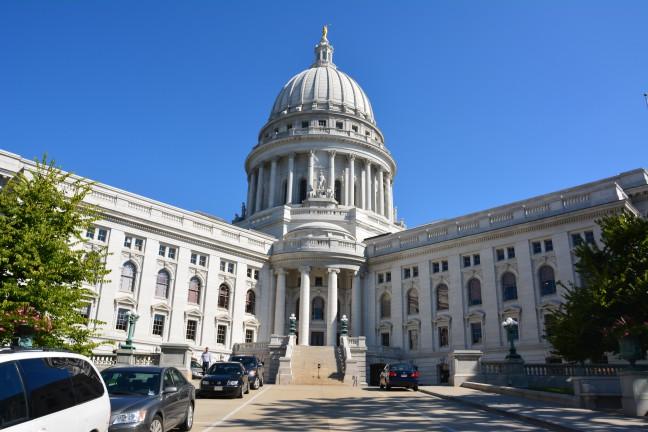Wisconsin’s state budget is expected to have a $620 million budget surplus, according to Center Square News.
Gov. Tony Evers proposed to spend $252 million of the surplus on public schools statewide whereas Republicans feel the surplus should be returned to taxpayers by reducing property taxes, according to Center Square News.
University of Wisconsin professor John Witte said before Evers’ term, under Republican administration, schools were underfunded over the last decade. Witte added Evers and the Democrats are very strongly supported by teachers associations and unions.
“When you spend money on education, you’re spending money on people,” Witte said.
Witte said the money goes to teachers, administrators and aids. Eighty percent of the cost of education at every level, from high schools to universities, goes toward personnel, salary or benefits.
Witte said Republicans are focused on cutting taxes. The first tax cut the Republicans enacted is for those in the upper income bracket, and now they are discussing a tax cut targeted towards the middle class.
“I don’t think Evers is going to get what he wants because Republicans simply have too big of a majority in the house and senate,” Witte said.
According to Center Square News, Senate Majority Leader Scott Fitzgerald (R-Juneau) tweeted Republicans are focused on using the surplus for a tax cut for hard-working families, and does not see the Republicans changing positions.
Fitzgerald spoke on behalf of the Republicans saying the party looks for ways to return the surplus money to taxpayers while Democrats keep looking for ways to spend money.
According to Center Square News, Evers said Wisconsin can have both – more money for schools and more money for taxpayers.
Evers follows through on vow, signs executive order for nonpartisan redistricting commission
Witte said the compromise between the two parties may be through property taxes. Witte said Evers wants to fund K-12 education with state funds, and two-thirds of the cost for school funding would come from the state, reducing the major portion that comes from local property taxes.
“That’s something they could agree on is trying to get more money for education and thus reduce property taxes,” Witte said. “Both sides think they get benefits out of reducing property taxes and they’re right.”
Witte said Democrats would prefer reducing property taxes and using the surplus for school funding because they believe it’s more solid that the current funding for schools comes from states, whereas Republicans do not like property taxes and want less state involvement.
According to Center Square News, Evers argued spending more money at the state level will allow local schools to not have to raise local property taxes nearly as often. In 2018, voters approved more than $2 billion in debt and revenue increases for local schools. Evers said more money from the state may bring an end to those types of local tax increases, according to Center Square News.
Evers announces plan to aid struggling dairy farmers during State of the State Address
Witte said if the property taxes are decreased, the money must be supplemented elsewhere.
According to Center Square News, Evers wants to spend more money on school mental health and wellness programs and hiring more school counselors, psychologists and nurses. The governor is proposing $80 million for special education reimbursement and promising to cover 100% of special education costs beyond $80 million.
UW student Trisha Saxena spoke on the impact of these services in her life.
“I have seen firsthand the impact of having access to a good counselor in a public school,” Saxena said. “It sets these kids up for a more successful life, and gives them the guidance they need to move forward.”
Witte spoke about the importance of these needs in schools, noting the biggest category is learning disabilities. Witte said misbehaving and other similar issues can be mislabeled as learning disabilities.
Witte said such behavior frustrates the teachers and causes them to remove the children from the classroom by labeling them as disabled which angers parents.
UW student Jordan Gao said this puts pressure on kids.
“With the increase in societal pressure for kids to do better and to participate in activities and get into good colleges, there is a lot more pressure and stress the kids are feeling,” Gao said. “It’s more vital that the government provides these resources to public schools.”
Board of Regents member Gerald Whitburn resigns, Evers to appoint replacement
According to Center Square News, Evers is also proposing $130 million in equalization aid. Witte said equalization refers to the process in which the government decides the allocation of money to each district based on a formula. Witte said the basic structure is the wealthier districts get less money while poorer districts will get more money per student. The process is to equalize funding across schools per child.
Madison is a rich district, Witte said. When applying the straightforward formula to Madison, the district would receive no funds. Witte said this is unfair.
According to Witte the timing of this issue is important because there is a surplus and Wisconsin has a biennium budget. The biennium budget will go through this summer while the next biennium will start in 2021 after the election.
“This is going to be an election issue,” Witte said. “Both sides are really positioning themselves for the election. Both sides critically think this election is important.”
The Democrats are desperate to try win at least the Assembly or the Senate, but they have a better chance of winning the Senate, Witte said.













